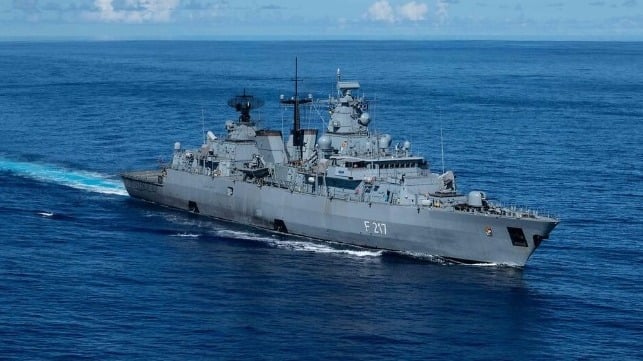Germany Ramps Up its Presence in the Indo-Pacific

[By Vanessa Geidel]
After 16 years of Angela Merkel’s leadership, a tight race on election night and almost two months of coalition negotiations in Germany, the Social Democratic Party, or SPD, returned to power with Olaf Scholz the new chancellor. With the Greens and the Free Democratic Party, they’ve formed the Ampelkoalition (traffic light coalition)—the federal republic’s first ever three-party governing arrangement.
The new chancellor is widely expected to largely continue Merkel’s legacy, but the coalition agreement outlining policy plans for the next four years signals changes in German’s approach to the Indo-Pacific.
Since the September election, two important announcements were made regarding future German activity in the region. In November, the chief of the German Navy, Vice-Admiral Kay-Achim Schönbach, said he would send vessels into the Indo-Pacific every two years with the intention of increasing cooperation with Japan, Australia and the US, and to advocate for peace, free navigation and maintenance of the rules-based international order in the South China Sea. The announcement came during a visit to Tokyo by the German frigate Bayern on its seven-month voyage through the region.
In September, the German Air Force will participate in Pitch Black, a multinational exercise hosted by the Royal Australian Air Force and scheduled to take place over northern Australia. Germany plans to send six Eurofighters, three refueling tankers and three transport aircraft, a significant step up in its Indo-Pacific participation.
While the navy and air force plans were put in place under Merkel, the new coalition has signaled its wish to increase Germany’s presence in the Indo-Pacific.
If the Scholz government stays true to that promise, then we’re likely to see Germany engage with more confidence, bluntness and interest to intensify cooperation with regional nations.
The coalition agreement aims to strengthen cooperation on multilateralism, democracy, climate protection, trade and digitalization, and to expand cooperation between the EU and ASEAN. The agreement specifically seeks increased cooperation on multiple levels with Australia, New Zealand, Japan and South Korea as values-based partners.
The agreement also seeks a stronger strategic partnership with India and says Germany wishes to address the impacts of climate change and to "stand up for those affected by rising sea levels."
If the coalition contract is to be taken at face value, German engagement with Beijing may be blunter than that of past administrations.
The agreement sets out a China policy driven by values and not afraid to criticize Beijing’s internal affairs and geopolitics. The agreement opposes Beijing’s "one-China" policy and strongly supports democratic Taiwan’s inclusion in international organizations. It takes the position strongly that all changes to the status quo in the Taiwan Strait must happen peacefully and with mutual agreement. The new government wants China to return to the "one country, two systems" principle for Hong Kong and it has undertaken to address human rights violations in Xinjiang against the Uyghur and Kazakh minorities.
This approach to China contrasts with the coalition contract at the start of Merkel’s final term in 2018. That deal chose to not address China’s human rights abuses in detail and only briefly mentioned its growing geopolitical importance. The 2018 contract favored trade and investment for Germany’s economic benefit. Merkel’s stance on China was at times considered too lenient and she appeared reluctant to make concrete statements condemning Beijing.
The 2021 agreement repeatedly uses the term "Indo-Pacific," which was not mentioned in the 2018 agreement, as Germany adopts new terminology championed by India, Australia and the US.
Indications are that the Scholz government will not be shy about stepping on Beijing’s toes. While some media outlets have suggested that the agreement signals a "break with China," Chinese government mouthpiece Global Times has downplayed the potential impact on relations. "It says the ‘landscape of China–Germany cooperation will not change" as "Scholz’s party has always advocated for dialogue with China." Chinese Foreign Ministry spokesperson Zhao Lijian has already warned Germany that issues such as Xinjiang, Hong Kong and Taiwan are "all China’s internal affairs."
While Scholz has not been an outspoken critic of Beijing, Germany’s new foreign minister, Annalena Baerbock, has made strong statements critical of China. Baerbock, who was the Greens’ candidate for chancellor, has described China’s Belt and Road Initiative as "hardcore power politics" and has urged a ban on products from Xinjiang, saying Europe must make sure that "products from forced labor do not come onto our market." Since becoming foreign minister on 8 December, she has spoken out against previous styles of German diplomacy, stating that "eloquent silence is not a form of diplomacy in the long run, even if it has been seen that way by some in recent years." She aims to establish a values-driven relationship with China based on "dialogue and toughness."
This week, Baerbock made her first official trip to the US, meeting with Secretary of State Antony Blinken. She stressed the importance of the German-American relations, stating that Europe has "no partner stronger than the US."
How much Germany’s Indo-Pacific policies of the next four years end up reflecting those outlined in the coalition agreement remains to be seen. If Scholz’s SPD could govern alone, we would likely witness a continuity of Merkel’s policy in the region. A significant deciding factor will be how much room Scholz will grant Baerbock to implement her own policies. If she is able to develop freely in the role, then Beijing can expect some difficult years ahead with Berlin.
Vanessa Geidel is a coordinator in ASPI’s professional development program.
This article appears courtesy of ASPI's The Strategist and may be found in its original form here.
The opinions expressed herein are the author's and not necessarily those of The Maritime Executive.
